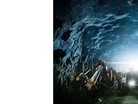Sweden’s LKAB sets out net-zero transformation path

LKAB, Sweden’s state-owed mining and metals group, is embarking on the biggest transformation in the company’s 130-year history which will be backed by one of the largest industrial investments ever made in the Scandinavian country.
Its new strategy sets out the path the company will take to achieve net-zero carbon emissions from its own processes and products by 2045 and secures the company’s operations with expanded mining beyond 2060. The strategy sets out three main tracks for the transformation:
- New world standard for mining
- Sponge iron produced using green hydrogen will in time replace iron ore pellets, opening the way for a fossil-free iron and steel industry
- Extract critical minerals from mine waste: using fossil-free technology to extract strategically important earth elements and phosphorous for mineral fertiliser from today’s mine waste
The transformation will require investments of between £869.3 million to £1.73 billion a year, over a period of around 15 to 20 years within LKAB’s operations alone. The statement adds that the new strategy is in response to market developments in the global iron and steel industry, which is undergoing a technological shift.
“The market for iron and steel will grow, and at the same time the global economy is shifting towards a carbon-free future. Our carbon-free products will play an important part in the production of railways, wind farms, electric vehicles, and industrial machinery. We will go from being part of the problem to being an important part of the solution,” says Moström.
The company states that the market for steel is forecasted to grow by 50 percent by the year 2050. This growth will be achieved by an increase in the upgrading recycled scrap in electric arc furnaces. Today, the iron and steel industry accounts for more than a quarter of industrial emissions and for seven percent of the world’s total carbon dioxide in the atmosphere.
The carbon-free sponge iron that will in time replace iron ore pellets as LKAB’s main export product is suitable for arc furnaces, allowing the company to offer industries around the world access to carbon-free iron, Moström says.
“In switching from iron ore pellets to carbon-free sponge iron we are taking an important step forward in the value chain, increasing the value of our products and at the same time giving our customers direct access to carbon-free iron. That is good for the climate and good for our business. This transformation will provide us with good opportunities to more than double our turnover by 2045,” he explains.
During the transformation period, the company will supply iron ore pellets in parallel with developing carbon-free sponge iron. It believes "rapid solutions" must be found for various complex issues including permits, energy requirements and better conditions for research, development and innovation.
“Our transformation will dramatically improve Europe’s ability to achieve its climate goals. By reducing emissions primarily from our export business, we will achieve a reduction in global emissions that is equivalent to two thirds of all Sweden’s carbon emissions. That’s three times greater than the effect of abandoning all cars in Sweden for good. It’s the biggest thing we in Sweden can do for the climate,” continues Moström.
“What Swedish industry is now doing, spearheaded by LKAB, is to respond to the threatening climate crisis with innovation and technological change. In doing so we are helping to secure a future for coming generations. This will also create new jobs in the county of Norrbotten, which will become a hub in a green industrial transformation. Succeeding in this will create ripples for generations to come. Not just here, but far beyond our borders. Now we are doing, what everyone says must be done,” adds Göran Persson, chairman of the Board of LKAB.
“Sweden will continue to take global leadership in the industry’s transformation and show that a fossil-free society is within our reach. By setting an ambitious climate agenda we can lay the best foundation for innovation and enhanced competitiveness, thereby creating sustainable jobs throughout the country,” states Isabella Lövin, Minister for the Environment and Climate.
“LKAB is a company of great significance both locally and for the whole of Sweden, and with this strategy will continue to play an important role in Sweden’s prosperity. Collaboration, innovation and technological development will enable LKAB to continue its operations and contribute to substantial reductions in carbon emissions as well as increased circularity. This will, in time, create a new Swedish export industry which also will bring about positive change beyond Sweden’s borders,” concludes Ibrahim Baylan, Minister for Business, Industry and Innovation.



